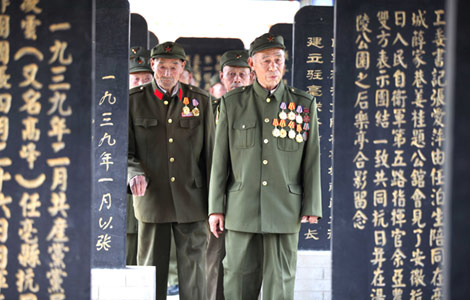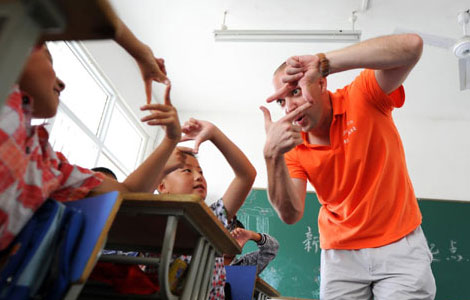China plays responsible role in challenging era
Updated: 2012-10-01 13:59
(Xinhua)
|
||||||||
BEIJING - In the French Riviera resort of Cannes in early November 2011, a murky spell of strong wind and heavy rain swept away the usual glamor and cast the town into damp gloom.
The uninviting weather, however, befitted the moment, as leaders of the Group of Twenty (G20) major economies gathered in the Mediterranean town to seek ways to reinvigorate the still stagnant world economy.
Since the outbreak of the US subprime mortgage crisis, global growth still remained sluggish and fragile, stunted by a festering debt crisis in Europe, a slackening recovery in the United States and increasing pressure on emerging economies.
It was indeed a time of great trial and test. But it is against this challenging backdrop that China has stepped into the limelight and played a responsible role on the world stage.
"Given the serious risks facing the global economy and continued market volatility, ensuring growth and promoting stability should be the top priority for the G20 Summit," Chinese President Hu Jintao said unequivocally at the Cannes meeting.
Just as he had done at the previous five G20 summits, Hu also urged the grouping, which had become the premier forum for international economic cooperation, representing more than 90 percent of global GDP, to "demonstrate the spirit of standing together in times of adversity and pursuing win-win cooperation."
What was striking was that, at a time when major developed countries were deeply preoccupied with their own woes and trade protectionism was rearing its head, China, notwithstanding its own pressures, honored its commitment to common development and prosperity by extending a true helping hand to the least developed countries (LDCs).
"To further help the least developed countries in their development endeavor, China will ... give zero-tariff treatment to 97 percent of the tariff items of exports to China from the least developed countries having diplomatic ties with China," Hu declared.
This unexpected announcement gained worldwide applause. Waheedullah Ghazikhel, spokesman for the Afghan Ministry of Commerce and Industries, told Xinhua shortly after Hu's announcement that the program would further promote bilateral trade and facilitate his country's postwar reconstruction and development.
China, commented Valentine Rugwabiza, deputy director-general of the World Trade Organization, had set a good example for others to follow in helping the LDCs.
"China has managed to sit at the table of the world's leading powers and to do so in a constructive and positive way," said former French Prime Minister Jean-Pierre Raffarin in a recent interview with Xinhua.
Robust growth driver
The assistance for the LDCs is only part of China's responsible approach and commitment to common development and prosperity. Among others, the dedication is particularly salient in China's interaction with Africa, the continent with the largest numbers of LDCs and developing countries.
Under the framework of the Forum on China-Africa Cooperation (FOCAC), which was set up in 2000, China has offered soft loans worth $15 billion to Africa, and its open market and direct investment have been a strong propelling force for the continent's growth.
Meanwhile, China has surpassed the United States as the continent's largest trading partner, with bilateral trade volume reaching 166.3 billion dollars in 2011.
China is not just transfusing blood, but also helping the rising continent improve its own blood-making capability. It has helped local communities in 50 countries build some 200 social projects, including schools, hospitals and model farms, and has trained 40,000 technicians for African countries.
Between 2001 and 2010, according to The Economist magazine, six of the world's 10 fastest growing economies were in Africa.
China-Africa cooperation, said UN Secretary-General Ban Ki-moon in July 2012 at the Fifth Ministerial Conference of the FOCAC in Beijing, was not only creating opportunities for African countries to diversify their economies, create jobs and improve health care and education, but also contributing to the world economy at a time when the world's traditional economic engines had sputtered.
As regards accusations against China of being a neocolonialist or resource exploiter, US scholar Deborah Brautigam, author of "The Dragon's Gift: The Real Story of China in Africa" and an Africa researcher at Johns Hopkins University, offered a telling answer.
"When people asked about whether they see China as a new colonial power, Africans told me, 'we know colonialism and these (questions) are insulting our intelligence,'" she told Xinhua in a recent interview.
The world has also seen China acting responsibly and constructively elsewhere, particularly in such multilateral international organizations as G20 and APEC, where China has been leading the charge against protectionism and in the struggle for more growth.
As the rest of the world was paralyzed by the financial crisis originating from Wall Street, China promptly unleashed a 4-trillion-yuan (about $570-billion) stimulus package, turning itself into a major driving force of global growth.
China has also pledged a $43-billion contribution to the recapitalization of the International Monetary Fund, which urgently needs the money to help the crisis-plagued Europe.
During the past 10 years, China has navigated its economic ark through numerous patches of capricious and unchartered waters, impressing the world with breathtaking growth and remarkable resilience.
Official statistics show that, in the past decade, China has overtaken Britain, France, Germany and Japan and morphed into the second largest economy in the world, and its tremendous and still growing market is creating more and more opportunities for the whole world.
According to Goldman Sachs, China contributed more than 20 percent to the world's GDP growth during the 2000-2009 period. World Bank figures showed that in 2009, the peak of the international financial crisis,China's contribution exceeded 50 percent.
China had made "enormous contributions" to pulling the world out of the 2008 global financial wipeout, said Pieter P. Bottelier, a senior adjunct professor of China studies at the School of Advanced International Studies of Johns Hopkins University in Washington.
"Without China, the world could not have recovered so quickly," he said.
Responsible peacekeeper
"This is Chinese escort task force. Please contact me on channel 16 if you need any assistance."
Merchant ships plying the Gulf of Aden are now no stranger to this radio message, which is broadcast daily both in Chinese and in English over this busy and vital stretch of water off the Somali coast.
China has been an active participant in the counter-piracy patrols there since 2008, when its first navy escort flotilla joined the international policing mission. Now with the 12th deployment there, Chinese fleets have escorted more than 4,700 Chinese and foreign vessels through what is nicknamed Pirate Alley.
When thanking the Chinese fleet for its protection and assistance for a Philippine ship off the Somali coast in mid-2009, then Philippine Vice President Noli de Castro said that China's escort mission in the Gulf of Aden was a true reflection of its demeanor as a responsible power.
Meanwhile, China has so far dispatched some 21,000 peacekeepers to 30 UN blue-helmet missions, the most among the five UN Security Council permanent members.
They are deployed in the most adverse circumstances, such as scorching deserts and hazardous rainforests, and they are engaged in the most dangerous tasks like mine-sweeping and bomb-defusing.
Chinese peacekeepers were important to international peacekeeping missions both in quantity and quality, Brig. Gen. Jean Baillaud, chief of staff of the Office of Military Affairs at the UN Department of Peacekeeping Operations, said in July.
"They show very strong commitment and also very strong discipline," he said, adding Chinese peacekeepers were also regarded by the local population as "an asset" because they built roads, treated the sick and provided other types of practical assistance for local communities.
On the Korean Peninsula nuclear issue, China, as the host of the Six-Party Talks, has functioned as more than just a coordinator. Linda Jacobson, East Asia program director at the Lowy Institute for International Policy in Australia, said China had played a responsible part both in facilitating talks and in solving emergencies, which was conducive to regional security.
Regarding the Iranian nuclear controversy, China always advocates and supports a peaceful approach, and opposes counterproductive embargoes and sanctions. Mohsen Saleh, a professor and Iran expert at the Lebanese University, said China's stance accorded with the UN Charter and international law and was constructive and serious.
In its dealing with the profound changes that have remolded West Asia and North Africa, especially with the Syria crisis, China unswervingly champions the peaceful approach and insists that only the people of those countries have the right to determine their nations' futures.
China's consistent position has eventually prevailed over suspicion and calumniation. Syrian writer Fayad Ezzidine, an independent observer of the Syrian crisis, said China's approach stood for international justice and China played a positive role in addressing the Syria conflict.
Deep-rooted commitment
China's commitment to world peace and common prosperity is not without reason. It is deeply rooted in the beliefs of the Chinese nation and its leaders, which were spelled out by President Hu in a historic speech at the UN summit commemorating the 60th anniversary of the founding of the world body.
"Throughout our long history, human communities have never been so closely interconnected in interests and destinies. Our common goals have put us all in the same boat, and the common challenges we face require that we get united. Let us join hands and work together to build a harmonious world with lasting peace and common prosperity," he said.
Out of this conviction, China, as Hu proclaimed in his 2007 report to the 17th National Congress of the Communist Party of China, has always adhered to the path of peaceful development, upholding the UN Charter and international norms, standing for fairness and justice and seeking no hegemony or expansion.
This is also reflected in the "China's Peaceful Development" white paper, which was released in September 2011: "Taking the path of peaceful development is a strategic choice made by the Chinese government and people in keeping with the fine tradition of Chinese culture, the development trend of the times and the fundamental interests of China, and it is also a choice which China's development calls for."
The choice was in no way forced upon China by external factors, stressed Huang Renwei, vice president of the Shanghai Academy of Social Sciences, adding it stemmed from a thorough examination of the Chinese and global history and an insightful recognition of the increasing interdependence of today's world.
While addressing the World Peace forum held in July in Beijing, Chinese Vice President Xi Jinping reiterated China's new security concept, which is characterized by mutual trust, mutual benefit, equality and coordination, and urged the world to pursue security through development, cooperation and innovation.
History has demonstrated that China has become "an active participant in, constructor of and contributor to the international system," said Xi.
"China will continue to fulfill its due international responsibilities and obligations," he said. "To make due contribution to the progress and development of mankind is a long-standing and solemn commitment of China."











